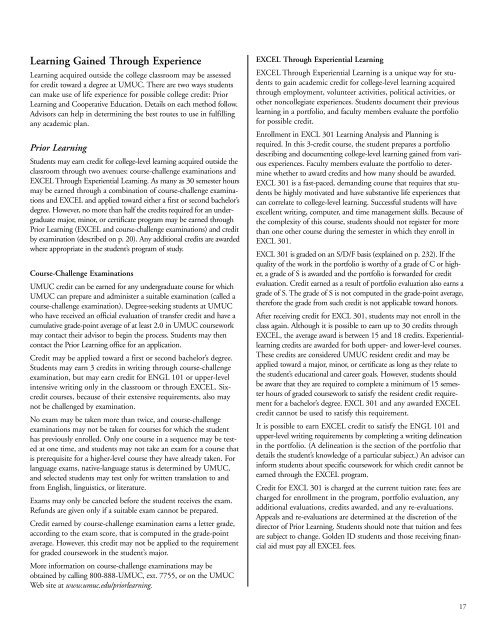1a. IntroSUS 2003 - University of Maryland University College
1a. IntroSUS 2003 - University of Maryland University College
1a. IntroSUS 2003 - University of Maryland University College
- No tags were found...
You also want an ePaper? Increase the reach of your titles
YUMPU automatically turns print PDFs into web optimized ePapers that Google loves.
Learning Gained Through ExperienceLearning acquired outside the college classroom may be assessedfor credit toward a degree at UMUC. There are two ways studentscan make use <strong>of</strong> life experience for possible college credit: PriorLearning and Cooperative Education. Details on each method follow.Advisors can help in determining the best routes to use in fulfillingany academic plan.Prior LearningStudents may earn credit for college-level learning acquired outside theclassroom through two avenues: course-challenge examinations andEXCEL Through Experiential Learning. As many as 30 semester hoursmay be earned through a combination <strong>of</strong> course-challenge examinationsand EXCEL and applied toward either a first or second bachelor’sdegree. However, no more than half the credits required for an undergraduatemajor, minor, or certificate program may be earned throughPrior Learning (EXCEL and course-challenge examinations) and creditby examination (described on p. 20). Any additional credits are awardedwhere appropriate in the student’s program <strong>of</strong> study.Course-Challenge ExaminationsUMUC credit can be earned for any undergraduate course for whichUMUC can prepare and administer a suitable examination (called acourse-challenge examination). Degree-seeking students at UMUCwho have received an <strong>of</strong>ficial evaluation <strong>of</strong> transfer credit and have acumulative grade-point average <strong>of</strong> at least 2.0 in UMUC courseworkmay contact their advisor to begin the process. Students may thencontact the Prior Learning <strong>of</strong>fice for an application.Credit may be applied toward a first or second bachelor’s degree.Students may earn 3 credits in writing through course-challengeexamination, but may earn credit for ENGL 101 or upper-levelintensive writing only in the classroom or through EXCEL. Sixcreditcourses, because <strong>of</strong> their extensive requirements, also maynot be challenged by examination.No exam may be taken more than twice, and course-challengeexaminations may not be taken for courses for which the studenthas previously enrolled. Only one course in a sequence may be testedat one time, and students may not take an exam for a course thatis prerequisite for a higher-level course they have already taken. Forlanguage exams, native-language status is determined by UMUC,and selected students may test only for written translation to andfrom English, linguistics, or literature.Exams may only be canceled before the student receives the exam.Refunds are given only if a suitable exam cannot be prepared.Credit earned by course-challenge examination earns a letter grade,according to the exam score, that is computed in the grade-pointaverage. However, this credit may not be applied to the requirementfor graded coursework in the student’s major.More information on course-challenge examinations may beobtained by calling 800-888-UMUC, ext. 7755, or on the UMUCWeb site at www.umuc.edu/priorlearning.EXCEL Through Experiential LearningEXCEL Through Experiential Learning is a unique way for studentsto gain academic credit for college-level learning acquiredthrough employment, volunteer activities, political activities, orother noncollegiate experiences. Students document their previouslearning in a portfolio, and faculty members evaluate the portfoli<strong>of</strong>or possible credit.Enrollment in EXCL 301 Learning Analysis and Planning isrequired. In this 3-credit course, the student prepares a portfoliodescribing and documenting college-level learning gained from variousexperiences. Faculty members evaluate the portfolio to determinewhether to award credits and how many should be awarded.EXCL 301 is a fast-paced, demanding course that requires that studentsbe highly motivated and have substantive life experiences thatcan correlate to college-level learning. Successful students will haveexcellent writing, computer, and time management skills. Because <strong>of</strong>the complexity <strong>of</strong> this course, students should not register for morethan one other course during the semester in which they enroll inEXCL 301.EXCL 301 is graded on an S/D/F basis (explained on p. 232). If thequality <strong>of</strong> the work in the portfolio is worthy <strong>of</strong> a grade <strong>of</strong> C or higher,a grade <strong>of</strong> S is awarded and the portfolio is forwarded for creditevaluation. Credit earned as a result <strong>of</strong> portfolio evaluation also earns agrade <strong>of</strong> S. The grade <strong>of</strong> S is not computed in the grade-point average,therefore the grade from such credit is not applicable toward honors.After receiving credit for EXCL 301, students may not enroll in theclass again. Although it is possible to earn up to 30 credits throughEXCEL, the average award is between 15 and 18 credits. Experientiallearningcredits are awarded for both upper- and lower-level courses.These credits are considered UMUC resident credit and may beapplied toward a major, minor, or certificate as long as they relate tothe student’s educational and career goals. However, students shouldbe aware that they are required to complete a minimum <strong>of</strong> 15 semesterhours <strong>of</strong> graded coursework to satisfy the resident credit requirementfor a bachelor’s degree. EXCL 301 and any awarded EXCELcredit cannot be used to satisfy this requirement.It is possible to earn EXCEL credit to satisfy the ENGL 101 andupper-level writing requirements by completing a writing delineationin the portfolio. (A delineation is the section <strong>of</strong> the portfolio thatdetails the student’s knowledge <strong>of</strong> a particular subject.) An advisor caninform students about specific coursework for which credit cannot beearned through the EXCEL program.Credit for EXCL 301 is charged at the current tuition rate; fees arecharged for enrollment in the program, portfolio evaluation, anyadditional evaluations, credits awarded, and any re-evaluations.Appeals and re-evaluations are determined at the discretion <strong>of</strong> thedirector <strong>of</strong> Prior Learning. Students should note that tuition and feesare subject to change. Golden ID students and those receiving financialaid must pay all EXCEL fees.17

















